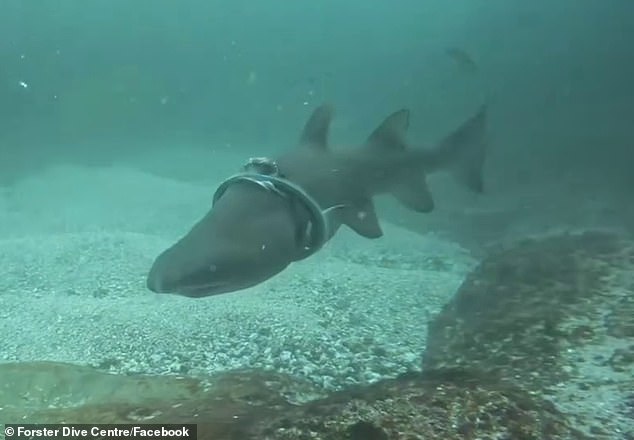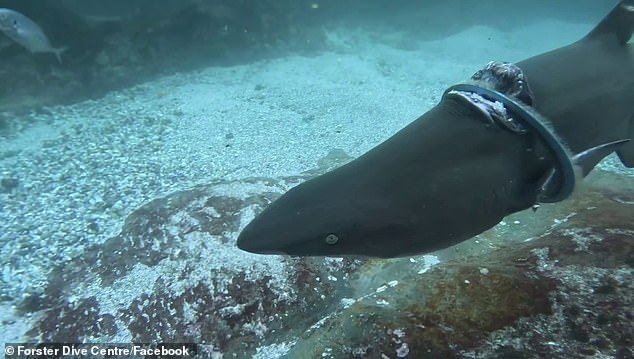Shark caught in plastic ring at Seal Rocks, NSW
A disturbing video has emerged of a shark swimming with a plastic ring wrapped around its body and cutting into its skin.
The female juvenile gray nurse shark was spotted in the waters of Seal Rocks, on the NSW north coast, by the Forster Dive Center on March 24.
Much of the shark’s skin had been cut out by the plastic ring wedged around her torso, near her head.
The dive center shared the heartbreaking footage as a reminder of the impact improper waste disposal can have on marine life.
The female juvenile gray nurse shark was spotted swimming in the waters of Seal Rocks, on the NSW north coast, by the Forster Dive Center on March 24.
“She is living with what appears to be a round plastic ring that resembles a Frisbee and it is severely cutting into her body,” they said.
‘She’s about 1.6 meters tall and probably won’t last long like this.’
Amelie Chipeaux, the centre’s lead diving instructor, said it was devastating to see the shark so helpless.
“I was lucky enough to get a close look at her and it seems the ring around her body was very thick and I couldn’t help her,” she told Daily Mail Australia.

The shark was seen swimming with a large plastic ring around its head

The 1.6 meter long shark had a large part of its skin cut out by the plastic ring
‘Shocked and crying into my diving mask, I could do nothing but watch her swim away as best I could.
“We saw her twice on this dive, but she was too scared to let us close enough to do anything to help.”
Ms Chipeaux said the team has contacted the NSW Department of Primary Industries and is awaiting a response.
A DPI spokesperson told Daily Mail Australia they had received no official reports about the shark.
“If the public has any information about this incident, they can report it via the Fishers Watch telephone line on 1800 043 536 or via the online form on our website,” they said.
One of the shark’s fins also got stuck in the ring and she was seen sticking up in an awkward position as she tried her best to swim around.
According to the International Union for Conservation of Nature, as much as 14 million tons of plastic ends up in the ocean every year.
Forster Dive Center urged people to take part in ‘take 3 for the sea’, where individuals are encouraged to collect three pieces of rubbish from the beach before leaving.

Experts say Lauren O’Neill (pictured) is lucky to be alive after being bitten by a shark while swimming in Sydney Harbor in January
Meanwhile, a renewed debate has recently emerged over the use of shark nets.
Australia has been rocked by a wave of shark attacks in recent months, drawing attention to whether nets are efficient.
University of Sydney shark management expert Dr Chris Pepin-Neff has investigated the use of lethal shark control measures such as nets in NSW and drum lines in Queensland, both of which he described as nothing more than political opportunism.
“Shark nets are a way to politically defraud the public,” he previously told Daily Mail Australia.
‘There is little evidence that nets work and protect swimmers.
‘But you can also have environmentally sustainable fences so that people can enjoy the harbor safely.’
His comments came after the non-fatal shark attack of Lauren O’Neill, 29, who had been swimming in Sydney Harbor near a private jetty in Elizabeth Bay in January.
Experts believe Ms O’Neill was bitten by a bull shark after examining photographs of the bite, which revealed harrowing details from eyewitnesses – including her leg ‘dragging behind her’ in the blood-stained water.
